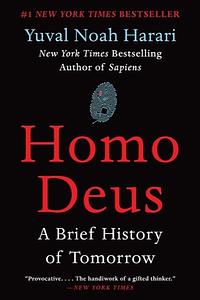You need to sign in or sign up before continuing.
Take a photo of a barcode or cover
informative
reflective
slow-paced
informative
medium-paced
I loved Sapiens, which I felt was full of valuable insight and interesting perspectives. But I hated Homo Deus, because it was full of misrepresented factoids and un-scientific fiction. Which might actually be identical reasons, just modulated by my comparative lack of understanding of history vs my keen interest in science fiction.
Essentially, Homo Deus seems to boil down to a short and superfluous summary of Homo Deus, and then various extrapolations into the future. But I felt like Harari doesn't have nearly as much insight into the present as he has for history, which leads his extrapolations wildly into the weeds.
And then there were all the awful analogies, all the woeful oversimplifications, and the myriad factual errors. It is possible that Sapiens contained just as many of those and I just didn't notice. Or maybe this book was rushed to ride on the success of its predecessor. Whatever the reason, I could not enjoy this book. Which is a true shame, as Sapiens will probably be my book of the year.
Essentially, Homo Deus seems to boil down to a short and superfluous summary of Homo Deus, and then various extrapolations into the future. But I felt like Harari doesn't have nearly as much insight into the present as he has for history, which leads his extrapolations wildly into the weeds.
And then there were all the awful analogies, all the woeful oversimplifications, and the myriad factual errors. It is possible that Sapiens contained just as many of those and I just didn't notice. Or maybe this book was rushed to ride on the success of its predecessor. Whatever the reason, I could not enjoy this book. Which is a true shame, as Sapiens will probably be my book of the year.
informative
slow-paced
informative
reflective
slow-paced
informative
reflective
medium-paced
Kolmas lukemani YNH kirja ja hyvin samantyylinen kuin edelliset. Hararin villit ja spekulatiiviset ajatukset tulevaisuudesta passaisivat kuitenkin paremmin scifi-kirjallisuuteen. Kirjailija on hyvin selkeästi historian asiantuntija, mutta muissa aiheissa mennään herkästi mutuun. Viihdyttävää ja helppoa luettavaa kuitenkin, varsinkin jos pintaraapaisut mahdollisista tulevaisuuksista kiinnostavat.
Ample vectors for discussion from this book. This was another that I'd like to re-read in a group, and see what others drew from it. My feelings about the book is evolving the more I think about it (no doubt the author's intent).
Main takeaway from the first part was that humans are at a point where our human constructs are intervening in the natural order to a higher degree than ever before. And this trend is accelerating.
It gets more interesting when he projects us as evolving to the point that more and more humans focus on idle tasks and consumption, and more jobs become automated. At some point, he posits that individuals will contribute less and less to society. Then it becomes essential for us to form 'networks' of humans that provide essential value. There's a ready analogy to neural networks spoken to, where the roles of individual nodes must be very flexible. This highlights the dilemma that liberal humanism will face in the world the author writes about. In such a world, the value of the individual will decline, as each of us seeks our way to provide value to society.
One of the other things that sticks with me is that Harari says that as we focus on individualism, we voluntarily concede our consciousness.
I'm not sure I buy the endgame Harari presents here, because he never spells out any sort of higher-level construct that 'governs' the collective intelligence. Left as an exercise to the reader, this feels like a pretty big omission (think of the executive function in our brains that selects a viable working model from many candidates). Still - pretty interesting.
I also heard the author use two terms in a way I'm not accustomed to. He seems to use the term "liberal" in the sense of a 'liberal modernizing society' (not in the political sense). He employs the term 'humanist' to mean 'viewing our world from a human-centric perspective', as in potentially at the expense of other species. Both of these took some adjustment on my part, which I actually appreciated.
I didn't really like that the author uses "Google" as a noun describing AI. I hear that name differently, referring to a company that earned most of its money through their targeted advertising platform. I get the shorthand, but still.
This is one that some will like, others will hate, and some of us (myself included) think it's food for thought.
informative
fast-paced




